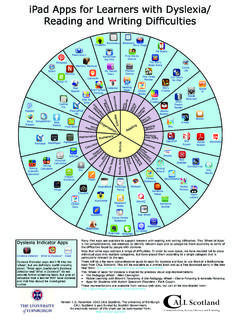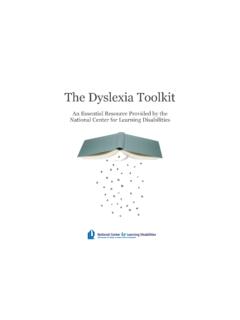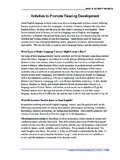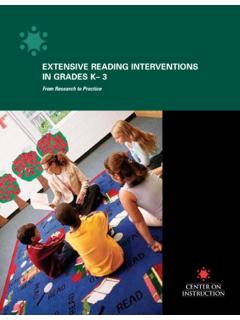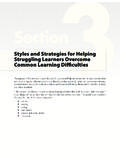Transcription of Auditory Processing Disorder and Reading Difficulties
1 Listen And Learn Centre 2010 Page 1 of 11 Auditory Processing Disorder and Reading Difficulties What is Auditory Processing ? Auditory Processing can be described simply as what the brain does with what the ear hears (Florida Department of Education, 2001, pg. 2). As sound travels through the ear it causes structures inside the ear to vibrate. These vibrations are then changed into electrical energy. The electrical energy travels through nerves in the central Auditory nervous system to the brain. In the central Auditory nervous system sound is interpreted, recognised and processed; this is called Central Auditory Processing (La Trobe University, 2010). Efficient Auditory Processing results in a number of Auditory abilities that are vital in the listening and communication process, these include: Auditory discrimination: the ability to discriminate between words and sounds by their duration (long vs.)
2 Short), intensity (loud vs. soft) or frequency (high vs. low). Auditory discrimination can affect Reading , spelling, writing and following directions. This skill is particularly tested in noisy environments where it becomes increasingly difficult to discriminate between sounds and words that are acoustically similar eg. thin and fin. Sound localization: is the ability to identify where the acoustic signal is coming from relative to the listener s position. Localization contributes to one s listening efficiency. Listen And Learn Centre 2010 Page 2 of 11 Auditory attention: the ability to direct one s attention to the relevant sounds, specifically speech, and hold that attention for an age-appropriate period of time. Auditory figure-ground: the ability to identify the primary Auditory signal from background and/or competing noise. Auditory closure: the ability to comprehend the entire word or message when part of it is missing.
3 This skill is used to understand messages in noisy listening environments. Auditory synthesis: the ability to blend or merge single phonemes into words. This is critical for Reading success. Auditory analysis: the ability to recognize phonemes or morphemes that are embedded in words. This skill is needed to distinguish verb tense ( jumped vs. jumps) and other markers that may be masked or lost by background noise. Auditory association: is the ability to identify the sound and attach meaning to it through labeling. It also involves the association of the sound with the language or non-language acoustic signal. Auditory association facilitates the development of Auditory memory. Auditory memory: is the recall of the acoustic signal after it has been labeled, and stored. (Florida Department of Education, 2001) What is Auditory Processing Disorder (APD)?
4 Auditory Processing Disorder (APD) is a sensory Processing deficit found to occur in approximately 5% of school-aged children (Kids Health, 2010). It is the inability or reduced ability to discriminate, recognize or understand Auditory information. APD adversely affects listening, comprehension, language and learning (Florida Department of Education, 2001). To learn one needs to listen to, attend to, and identify the important Auditory signals over all other competing noises at school and at home. Evidence suggests that underlying deficits in Auditory Processing may cause children with APD to experience hearing Difficulties in spite of normal hearing sensitivity. Children with APD are often distracted by, or may not hear clearly when background Listen And Learn Centre 2010 Page 3 of 11 noise is present; they may find it difficult to follow spoken instructions and often misinterpret what is said; they may have trouble understanding degraded speech and or identifying and discriminating between speech sounds (Sharma, Purdy & Kelly, 2009; Harper & Weiner, 2010; Florida Department of Education, 2001).
5 These Difficulties make learning more difficult and as a result children with APD often find school challenging (Florida Department of Education, 2001; Kraus & Banai, 2007). The American Speech-Language-Hearing Association (ASHA) describes APD as occurring when Difficulties in one or more of the following areas are observed: Auditory discrimination; sound localization; Auditory pattern recognition; decreased Auditory performance in the presence of background noise, competing acoustic signals and/or degraded acoustic signals (ASHA, 1996). When Difficulties occur in these areas the fidelity of the acoustic signal is compromised. If sounds cannot be accurately identified and discriminated between they will be misrepresented in the Auditory cortex and thus not processed accurately by the brain (Sharma, Purdy, Newall, et al., 2006; Ahissar, Protopapas, Reid & Merzenich, 2000).
6 It has been suggested that Auditory Processing deficits adversely affect one s ability to detect and process speech patterns, resulting in impaired or fuzzy phonological representations, specifically required for speech perception. Unclear phonological representations are likely to lead to impaired phonological awareness which in turn may result in the development of Reading problems/ disorders (Sharma et al., 2006; Ouimet & Balaban, 2009; Rosen, 1999). Phonological awareness- An essential skill for Reading Before a beginning reader can learn how to decode letters into sounds they must first understand that words are made up of sounds and that speech sounds (phonemes) can be represented in written spellings (the alphabetic principle) (Lyon, 2000). They must also have phonological awareness; the knowledge that spoken language can be broken down in various ways: Listen And Learn Centre 2010 Page 4 of 11 sentences into words, words into syllables ( bro/ther) and syllables into phonemes ( /c/ /a/ /t/).
7 Phonemic awareness is a component of phonological awareness involving the ability to hear, isolate and manipulate phonemes, for example the early reader must be able to hear the at sound in sat and bat , and recognise that the difference between the words lies in the first sound. A child with phonemic awareness should also be able to manipulate this sound to form similar sounding or rhyming words cat, fat, mat (Hoover, 2002; Lyon, 2000; Westwood, 2008). Strong phonological and phonemic awareness and a good understanding of the alphabetic principle are fundamental skills for Reading development and success (Wendling & Mather, 2009). If a child cannot hear the phonemes in words they are unlikely to be able to manipulate them. Consequently they may struggle with learning how to relate the sounds they hear to the letters in written words (the alphabetic principle) and as a result will struggle to decode words efficiently and accurately (Westwood, 2001).
8 A deficit in phonological awareness is believed to be the primary reason why many children have difficulty learning to read (Sharma et al., 2006; Blau et al., 2009; Ouimet & Balaban, 2009; Rosen, 1999; Ahissar, et al., 2000).. Dyslexia- A deficit in phonological awareness Dyslexia, otherwise known as specific Reading Disorder , is the most frequently diagnosed learning disability with reported prevalence rates ranging from 4-10% (Blau, Reithler, van Atteveldt, et al., 2009; Ouimet & Balaban, 2009; Rosen, 1999). Dyslexia is characterized by persistent Difficulties in spelling and Reading despite adequate instruction, motivation and intelligence (Sharma et al., 2009; Blau et al., 2009; Rosen, 1999). To be a successful reader one must have adequate knowledge of, and fast access to, the speech sounds (phonemes) corresponding with the letter combinations (graphemes) being read (Sharma et al.)
9 , 2006; Ouimet & Balaban, 2009). Listen And Learn Centre 2010 Page 5 of 11 If these sounds are not accurately retrieved, represented or stored Reading problems can arise (Ouimet & Balaban, 2009). A popular and current explanation for dyslexia is that there is an underlying deficit, in phonological Processing /awareness, characterized by Difficulties discriminating, recognizing and sequencing speech sounds (Sharma et al., 2006; Blau et al., 2009; Ouimet & Balaban, 2009; Rosen, 1999; Ahissar, et al., 2000). Along with poor phonological awareness, children with Reading Disorder (RD) consistently exhibit impaired phonemic awareness (Sharma et al., 2009; Sharma et al., 2006; Ahissar, et al., 2000). Auditory Processing Disorder - A cause of Reading Disorder APD results in the inability or reduced ability to discriminate, recognize or understand Auditory information.
10 It is characterized by inefficient Auditory Processing abilities which can cause deficits in phonological awareness (ASHA, 1996; Sharma et al., 2006; Ouimet & Balaban, 2009; Rosen, 1999; Westwood, 2001). A deficit in phonological awareness is believed to be the primary reason why many children experience Reading difficulty/ Disorder (Sharma et al., 2009; Sharma et al., 2006; Ahissar, et al., 2000). Because APD results in poor speech perception and impaired phonological representations, it could be hypothesized as follows: If APD is the primary impediment underlying a child s Reading Disorder , it is the major factor responsible for the child having Difficulties with learning to read (Sharma et al., 2006). Research Several researchers have identified a relationship between Auditory Processing disorders (APDs) and Reading disorders (RDs) (Sharma et al.)
